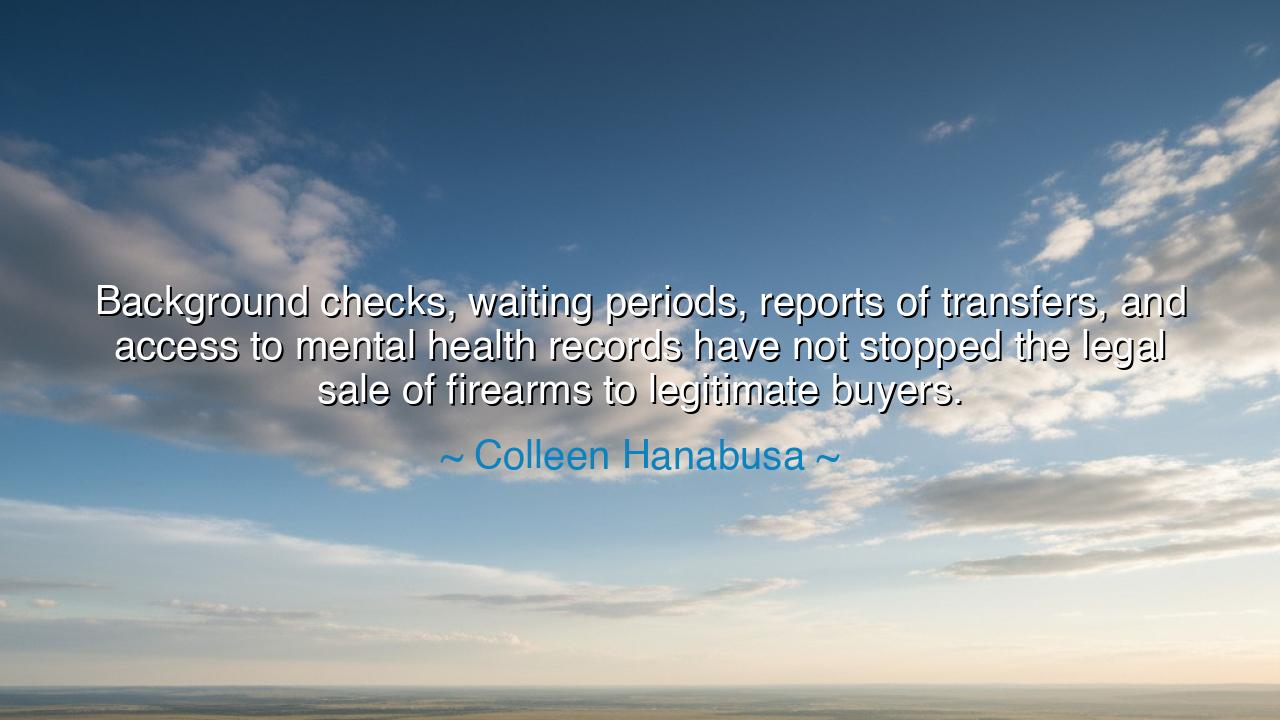
Background checks, waiting periods, reports of transfers, and
Background checks, waiting periods, reports of transfers, and access to mental health records have not stopped the legal sale of firearms to legitimate buyers.






Hearken, O seekers of wisdom and justice, to the words of Colleen Hanabusa, who spoke with clarity and reason: “Background checks, waiting periods, reports of transfers, and access to mental health records have not stopped the legal sale of firearms to legitimate buyers.” In this statement, she gives voice to a truth both sobering and profound—that laws alone cannot cleanse the heart, nor can procedure replace discernment. Her words stand as a reflection on the limits of governance and the unending tension between liberty and safety, between the rights of the individual and the fears of the collective.
From the earliest days of civilization, humankind has wrestled with the question of control—how to balance freedom with security, and how to shape laws that preserve both. The ancients knew that even the wisest law could not bind the will of man completely. Plato, in his Republic, warned that no law, however well written, could protect a people whose souls were disordered. Hanabusa’s reflection is born of this same understanding: that legal safeguards, though necessary, can never be perfect instruments. They may filter out danger, but they cannot foretell intention, nor transform the heart that hides behind a lawful act.
In naming background checks and waiting periods, Hanabusa acknowledges the good faith of governance—the effort of society to restrain recklessness through order. These measures are not the weapons of tyranny, but of prudence. Yet she also reminds us that the legitimate buyer, the one who passes every test, may still stand at the threshold of tragedy or misuse. It is a humbling reminder that no system can foresee the unpredictable nature of humanity. The law can trace a man’s history, but not his future; it can record his deeds, but not his hidden despair.
Consider the tale of President Abraham Lincoln’s assassin, John Wilkes Booth. He was not an outlaw by record, nor a man forbidden by law from carrying arms. By all measures of legality, he was a “legitimate buyer.” Yet the darkness of his heart transformed his hand into an instrument of ruin. So too, in every age, we find that evil often hides within the bounds of the lawful. This is not an argument against the law, but a plea to understand its limits—and to strengthen what law alone cannot touch: the moral fabric of the people.
Hanabusa’s tone is neither cynical nor hopeless. When she speaks of these regulations—these imperfect shields—she calls upon us to view them not as failures, but as incomplete guardians of a deeper truth. Civilization cannot rest solely upon statutes and signatures; it must rest upon virtue, vigilance, and community. The legal sale of firearms to the worthy is not in itself a corruption, but it demands a society mature enough to bear the weight of responsibility. The law provides the structure, but the soul of a nation must provide the conscience.
From this reflection arises a timeless lesson: that no civilization can be secured by law alone. The ancients built codes and commandments, yet they all knew that justice lives not in parchment but in the hearts of the people. If we wish to prevent violence, we must not only legislate—we must educate, heal, and cultivate empathy. For every weapon forged, there must be a hand guided by wisdom, and every right must be paired with an equal measure of restraint.
O children of the future, take this teaching into your lives: do not despise the law, but do not worship it either. Understand that it is but a mirror—reflecting the values of the society it serves. Strengthen that reflection with compassion, discernment, and courage. For a world that relies only on rules to restrain its chaos is doomed to fail; but a world where character, law, and love of humanity walk together—there, true peace may finally be born.






AAdministratorAdministrator
Welcome, honored guests. Please leave a comment, we will respond soon